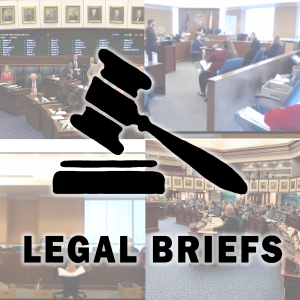Plus, a win for a roofing contractor
 A federal appellate court rules an insurance company waited too long to object to an appraiser, a state appellate court rules a trial court was too quick to order an appraisal, and a roofing contractor that complained the court was going to give away its trade secrets by revealing its job agreements and receipts has won its appeal. It’s all in this week’s Legal Briefs.
A federal appellate court rules an insurance company waited too long to object to an appraiser, a state appellate court rules a trial court was too quick to order an appraisal, and a roofing contractor that complained the court was going to give away its trade secrets by revealing its job agreements and receipts has won its appeal. It’s all in this week’s Legal Briefs.
Object Earlier: Earlier this month, a federal appeals court upheld a 2023 ruling in favor of Biscayne Beach Club Condominium Association, who had sued its carrier after a dispute over their payout for substantial storm damage. Westchester Surplus Lines Insurance Company first objected to the Condominium Association’s selected member on a panel of appraisers because of a 10% contingency fee which they argued would incentivize higher dollar awards. After selecting a new appraiser, supposedly without a contingency fee, negotiations continued for months – but only after the panel decided on a $14 million payout did Westchester object to the appraiser’s impartiality and pay arrangement. Too late, according to the court opinion, with Circuit Chief Judge William Pryor stating, “The party may not ‘sit idle,’ see whether the award is favorable, and then collaterally attack the proceedings on a ground that it declined to flag sooner.” Westchester’s lawyers argued previous court rulings provide grounds for a later objection. This has been described by the Insurance Journal as part of a troubling trend by some Florida insurance companies.
Appraisal Ripeness: Many twists and turns regarding appraisal ripeness have developed in the Heritage Insurance v. Sunset Villas Condominium Association case from May of this year. Heritage appealed a trial court order compelling appraisal, acknowledging damage but saying it fell below the deductible. After proof of loss from Sunset Villas claimed further damages, Heritage refused, and the association filed for a breach of contract. Heritage opposed a motion to compel appraisal and asked for an evidentiary hearing to ensure Sunset Villas complied with necessary post-loss duties on the supplemental claim. The case went before the Third District Court of Appeal, which reversed the trial court decision, ruling that the trial court must first hold an evidentiary hearing to determine whether the appraisal is ripe. If it is, then the trial court can decide in which order to handle appraisal and coverage issues.
Apex Roofing Trade Secrets: Apex Roofing and Restoration was claiming trade secret privilege in response to a trial court ordering disclosures of the company’s agreements, contracts, and receipts associated with a roof replacement. Its argument was that the trial court made a misstep by not holding an in-camera review to determine if the documents were in fact trade secrets before finding all the information discoverable. The Fifth District Court of Appeals agreed, ruling the trial court must make the trade secret determination, then show reasonable necessity for the documentation, and if the production of documents is so ordered, the court must set forth the basis for overruling the objection and each privilege assertion. Apex argued that while the information requested may be limited in scope, commercial secrets could easily be extrapolated. You can read more about this and the previous case in Kelley Kronenberg’s First-Party Property Appellate Division’s “In The Know” latest monthly newsletter.
LMA Newsletter of 8-19-24

